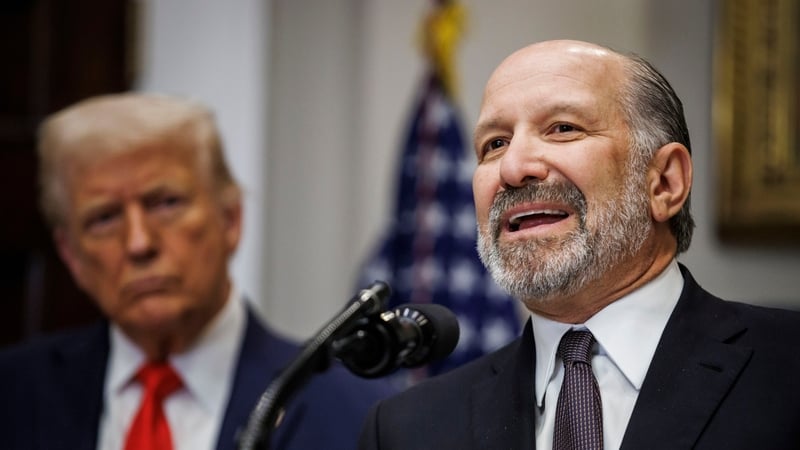Analysis: International co-operation to close the loopholes and exceptions facilitating corporate tax avoidance has reached unprecedented levels
US Secretary of Commerce Howard Lutnick has renewed his attack on Ireland, calling the country his "favourite tax scam". This is a shame, and it is difficult to rationalise a categorisation of Ireland being a so-called tax scam in 2025 when our corporate tax legislative architecture is up there with the best in class.
Perhaps such a label might have held in the past when Ireland offered tax holidays in the form of Export Sales Relief at a time when Ireland (as well as most OECD countries) did not have transfer pricing – rules designed to ensure the right amount of profits get taxed in the right jurisdiction.
In response to Howard Lutnick's comments, the Tánaiste said the focus should be on strengthening the "deeply integrated relationship" between Ireland and the United States that has "stood both extremely well over many decades"https://t.co/lOR2YuQQng
— RTÉ News (@rtenews) March 22, 2025
In 2013, Ireland was labelled a "tax haven" on the floor of the US Senate. It was a direct and public attack on Ireland's relationships with multinationals and their tax, and it forced the Government of the day to respond. On the floor of the Dáil, Michael Noonan, the then Minister for Finance, said that the government was going to crack down on 'stateless' companies registered here.
In the intervening years, there have been claims and counterclaims about Ireland’s tax practices. Claims of a 'sweetheart deal' with Apple, the alleged biggest US tax avoider of them all, have led to one of the world's largest tax cases.
Ireland’s denials and credibility took another massive hit in 2016 when GDP figures for 2015 were revealed. Ireland’s accounts became the punch line of the economic world for the day. Nobel laureate and former New York Times columnist Paul Krugman famously called the statistics "leprechaun economics", while the Financial Times had some more fun with the story, comparing the numbers to some of Ireland’s greatest works of fiction.
We need your consent to load this rte-player contentWe use rte-player to manage extra content that can set cookies on your device and collect data about your activity. Please review their details and accept them to load the content.Manage Preferences
From RTÉ Radio 1's News at One in 2016, CSO statistics for 2015 show Irish economy grew 26%, leading economist Paul Krugman to coin the phrase 'leprechaun economics'
Historically, Government policy has focused on having an attractive tax regime since the 1950s, when there was a major shift in industrial and tax policy moving from protectionism to a more open and outward-orientated approach. Globalisation has also eliminated most of the barriers to cross-border trade and investment and made tax a critical factor in the location of foreign direct investment.
But this has led to increased international tax competition. International tax law is a term used to describe a myriad of rules, both domestic and international, that affect the tax treatment of cross-border operations. Taxation is at the core of a country's sovereignty, but the interaction of domestic tax rules and double tax treaties has caused gaps and frictions to appear and be exploited by multinationals.
International co-operation has reached unprecedented levels. Drawing on the G20’s leadership, countries representing different development levels are working together to address tax evasion and loopholes that facilitate tax avoidance. Corporate tax avoidance is where companies use aggressive tax planning to minimise their tax bills. It often entails companies exploiting legal loopholes in tax systems, and mismatches between national rules, to artificially shift profits to low or no tax jurisdictions.
We need your consent to load this rte-player contentWe use rte-player to manage extra content that can set cookies on your device and collect data about your activity. Please review their details and accept them to load the content.Manage Preferences
From RTÉ Radio 1's The Business, with the same minimum Corporation Tax rate in force across the EU, will this hinder Ireland's competitiveness?
Corporate tax avoidance can result in the erosion of States' revenues and undermine fair burden-sharing between taxpayers (in particular between companies and private citizens) and fair competition for businesses. Tax transparency is an essential element in combatting corporate tax avoidance.
A plethora of recent international tax reforms have encouraged greater disclosure by corporations, tax administrations, tax planners and financial institutions as well as adoption of anti-abuse measures by governments in order to combat cross-border tax avoidance strategies. The OECD’s BEPS Action Plan initiative is one of the biggest game-changers in international tax policy in living memory. Its impact has changed the way multinational organisations engage in international business.
Structures used by well-known technological companies showcased Ireland as a facilitator of aggressive tax planning. However, commentators mostly overlook the impact of US tax legislation as key facilitators of such structures. Quite frankly, these structures would not have worked if US domestic tax rules known as 'check the box' were not in existence.
We need your consent to load this rte-player contentWe use rte-player to manage extra content that can set cookies on your device and collect data about your activity. Please review their details and accept them to load the content.Manage Preferences
From RTÉ Radio 1's Morning Ireland, RTÉ Economics & Public Affairs Correspondent David Murphy reports on Donald Trump threatened tax war over US multinationals
The complex corporate structures adopted by multinationals such as Google and Apple have been in response to the way US domestic tax rules interacted with international tax rules. The divergence in the US rules and Irish rules on the determining factors in corporate tax residence also played a role.
An unsettled global tax policy landscape will continue to increase risks of higher tax costs and administrative challenges for multinationals. The outlook for action on the OECD's Pillar One proposals is in doubt, leaving both the issue of digital services taxes unresolved and the future sustainability of traditional transfer pricing principles at risk. Whilst the OECD's Pillar Two regime has been implemented by means of the EU Minimum Tax Directive (now transposed into Irish law), recent moves by Trump 2.0 have cast serious doubts on its viability. Multinational corporations crave certainty which is being seriously eroded by announcements from the US.
It is difficult to rationalise a categorisation of Ireland as a tax scam in 2025 when our corporate tax legislative architecture is up there with the best in class
Taxes that are appropriate in the context of a national, or domestic, environment, however, do not necessarily operate efficiently when economic enterprises involve significant cross-border activity. Much of the complexity of current tax systems originates from the need to interact with other national tax systems in a global environment.
Tax systems that have evolved differently in other countries, each with their own peculiarities, emerge as something quite different when they interact with other tax systems in the international marketplace. The GloBE initiative, introducing the 15% minimum tax rate, is welcome when set in this context. However, having just been brought to life, its removal or modification is not so desirable.
Follow RTÉ Brainstorm on WhatsApp and Instagram for more stories and updates
The views expressed here are those of the author and do not represent or reflect the views of RTÉ



